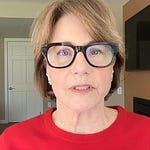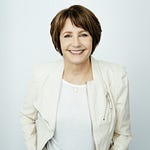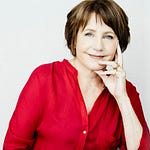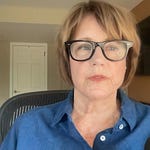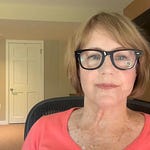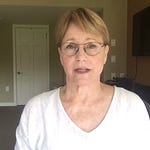Hello and welcome to my podcast. I'm Sherold Barr, a master coach and writer, and today I'm interviewing one of my favorite people, Al Watt of LA Writers Labs.
I discovered Al and his writing programs during the pandemic. My friend Jackie told me about Al's programs three different times over a period of years.
I signed up during the pandemic and have been in Al's programs four years. It's been an extraordinary experience. I wanted to share what Al's doing with you.
Al founded LA Writers Labs where he teaches the 90-day novel, 90-day memoir, 90-day screenwriting, and Rewrite Masterclass. He teaches two writing workshops in Tuscany each May. If you’re interested in doing something like that, get in this workshop. I've done it and it's fabulous.
A picture of our group at the Tuscany writing workshop in 2022.
Al is also the bestselling author of Diamond Dogs and Days Are Gone. He’s the recipient of the American Literary Library Association's, Alex Awards, the Barnes and Noble Discover Great Writers. Al's 90-day Novel is Amazon's number one book on writing. Al has written six more books, and most recently is the 90-Day Memoir. Al, thank you so much for being here. I'm thrilled to have you here.
Al: Thanks for having me, Sherold. It's good to see you.
SB: It's good to see you too. So can you share a little bit more about your programs and how you began to use your structure to help writers?
Al: I guess to distill it,
I would say what I'm teaching is a process of marrying the wildness of your imagination to the rigor of story structure. And for storytellers, it's a very powerful way to approach story.
I think a lot of times writing workshops tend to do one or the other. They either focus on a lot of free writing, which really helps you discover your voice. But then I get a lot of writers coming to the workshops saying, I've got eight hundred pages, but it doesn't have any shape to it. and I don't know how to, how to structure it.
Or there's this sort of typical Hollywood workshop, which approaches story structure as kind of a formula, which any true artist sort of resists because who's interested in formula storytelling, right? So the challenge is to create something that's really original and alive.
The way we do that is sort of a mystical process of taking your wild imagination and find a way to distill it to its nature so that your story has a beginning, a middle, and the end.
I think the goal is to make the whole greater than the sum of its parts.
I think a lot of times story structure is taught by story analysts and they tend, whether consciously or not, is to approach it sort of like it's math, kind of like it's figuring something out. They tend to be really good at deconstructing a work. And then the notion is that they've shown you the parts, the machinery of the story, now you ought to be able to go and write your own.
But to me it's sort of like dissecting a cadaver in order to discover what it means to be human - the whole is greater than a series of parts. So there's magic or mystery to story.
A big part of the workshop is also intuitive. It's about listening for the unsaid when I'm working with writers. I have a lot of questions I ask writers but there's also craft involved. So it's really about marrying the intuition to craft.
SB: Yes, it's fascinating how you work with a subconscious. You use the structure for the first 30 days, is that right?
Al: Yes. In the 90-Day Novel, for example, the first four weeks are exploring the structure. We do a lot of stream of consciousness writing exercises and connecting to something I call the structure questions in order to allow an outline to emerge, which is different than trying to figure out your outline.
I think a lot of times writers confuse story structure with plot. It's not. Story structure has nothing to do with plotting. Story structure really is the internal structure.
Character suggests plot.
So when you start to explore your characters, in relationship to each other, plot starts to emerge to support those experiences.
SB: Can you talk about the primal desire — the fact that we're all out there chasing a desire, but it's really a false belief.
Al: Okay. I realized that most writing books talked about the dramatic problem. I don't know why that always confused me and bothered me. One day I woke up and I realized that problems are solved. I thought, wait a second.
I don't think the character has a problem. I think they have a dilemma. The difference is that problems are solved. They're intellectual but dilemmas are only resolved through a shift in perception. I believe every story is about transformation or a shift in perception.
There's a quote from Einstein.
“You cannot solve a problem with the same mind that created it.”
He could be speaking just as much about story. Because if story was simply the solution to a problem, readers would be very disappointed. Because we don't really care if the character gets what they want. We care that they get what they need.
When I realized that your protagonist is struggling, not with a problem, but with a dilemma, I started to explore the ingredients to a dilemma.
I think of a dilemma as a problem that can't be solved without creating another problem.
There's two ingredients to a dilemma:
A powerful desire. I have to want something, and the stakes are life and death. If I don't get {blank}, my life will be unimaginable.
And a false belief, which is the misperception I have about myself or the world.
So for example, the dilemma of faith would be powerful desire. I want to believe in something. And the false belief, until you show me proof, I refuse to believe.
The dilemma of freedom might be that I want to be free, but I believe I must escape in order to be free. But as long as I'm constantly trying to escape that thing, I might never experience true freedom.
So in other words, story isn't about will the character get what they want? Story is about will they reframe their relationship to their primal desire?
In other words, by the end of the story, freedom may no longer be about escape. It might now be about confronting my oppressor or speaking my truth.
SB: I think what's so amazing about your program is how you're able to listen for what's not said, and for me it was that I don't trust yourself. I don't trust myself? [laughter]. And let's talk for a minute about my own dilemma because I think that we can use that.
My own dilemma was that I had a belief my father told my sister and I when we were young. But I didn’t remember this belief — it was in my subconscious.
After the accident seven years ago, when I was in the hospital after a near-fatal accident, my sister and I talked and for some reason, she asked me if I remembered what Dad drilled into us growing up:
“Don't depend on anyone. You have to take care of yourself.”
Suddenly my body started shaking all over. I knew it was true because the body is a truth teller.
I had completely forgotten this belief. But all my work life was driven by the belief that I wanted to be independent and successful so I could make a lot of money. What I wanted was to be safe and secure.
Al: Yes, that was your want.
SB: Yes, and I don't know what else you wanna say about it, but I think that realizing I've been driven for at least forty-plus years with a belief that my my life hard because I prioritized work over my relationships. When I discovered I’d been so driven by an unconscious belief, I felt sad.
Al: What we want is always outside of ourselves. What we need is always within us.
So what you wanted was security. The false belief is when I make lots of money, then I'll be secure.
So notice how what I want is this idea of security. Right? When I make lots of money, then I'll be secure.
Al: What I need is security. This your story is about security, but it's about reframing my relationship to security. So at the beginning of the story, lots of money means security. By the end of the story, security comes from within. And that doesn't mean there's anything wrong with having lots of money. But when you discover that security comes within, it becomes possible to have lots of money. If lots of money belongs in your life, you can have the lots of money. But we all know that it doesn't matter how much money one has.
If you doesn't find inner security, it's irrelevant. In fact, it can also make you feel increasingly insecure. Because it just becomes more evidence of their insecurity. I have everything that I thought would make me secure but I still don't have security.
SB: Yes. [laughter] It's been a great process and I’ve learned so much about myself. This whole process has been fantastic. It's not so easy, but good for me.
Al: Yes. It's hard, but not the hard work of digging ditches. I think even though writing looks like it's a process of accumulating words, it's a process of shedding false beliefs, getting down to distilling the truth.
I love doing this work because I find it very satisfying and illuminating for me because there really is this process to get to the truth. And if somebody's really willing and curious to do the work.
I believe our creative work ultimately is nothing more than a byproduct of our spiritual growth.
As long as we're willing to do the work and sit down and put words on the page, we're gonna be led to the truth we're seeking.
SB: Yes. That's it. The truth. So you say when writers connect with their fears, they write from a place of truth and vulnerability, and that becomes universal. Can you talk about the personal and the universal?
Al: Okay. So first of all in every story, the challenge is to make the personal universal. So whether you're writing memoir or fiction, the protagonist's personal dilemma is always universal to the reader.
So the challenge is to recognize the nature of the dilemma as opposed to the idea of the dilemma.
I'll work with writers and they'll sometimes think the dilemma has to do with, with their particular situation. And while it does, the situation is just an event to support the dilemma, you know, faith or freedom or justice or connection or belonging or success, or doesn't matter what, whatever the theme is. But I feel like you're asking me a two part question. So that's the first part, which is what's personal to the storyteller, the challenge is to make it universal to the reader.
The personal is the plot, the universal is the theme.
It's something we can all relate to. We don't have to relate to the specifics of the of the character's situation in order to relate to the nature of their struggle.
The second thing you were asking about was fear. The first exercise I always do in the workshop is I have them write this:
I'm afraid to write this story because _________. As they make a list of all the fears that are coming up in writing this story. I say, do you see the fears that you have in writing your story are identical in nature to the fears that your protagonist has in the story? I've been doing this for 20 years, and they always say, oh my God, it's true.
It's because we are uniquely qualified to write our story. The fears that we have in writing the story are identical to whatever your protagonist is struggling with.
If you distill the story to its nature, you start to see how it's the same dilemma the writer is trying to work out in their own life.
I always say the desire to write is really the desire to evolve by resolving an inner dilemma.
As you start to explore your story, you realize that your story idea came to you as an invitation to let go of a limiting belief that you have about yourself or the world.
That's what I mean by our creative work really becomes a byproduct of our spiritual growth.
SB: Yes, I agree. You have so many different people that come into your workshops. You have novelists, screenplay writers, and NYT best-selling authors. I consider myself a beginner when I started in your programs.
I appreciate how inclusive you make your programs, how supportive they are, because I’ve taken writing workshops before and there's been plenty of prompts. But I’d go home with all these prompts and ideas, but I didn’t know how to put it together.
Now what I'm doing is pairing my memoir down to the most important scenes and dramatizing more where I didn't dramatize in the beginning. I think it's been a great experience. The small groups of writers - our cohorts - help review our pages weekly. That’s been an incredible helpful and supportive.
I don't think I've been in any program where people have been so happy. Al, I’ve never been in a program where there is this caliber of people and you know each of our stories. I wouldn't have gotten this far with my memoir.
SB: Do you want to say anything about what's the biggest mistake that writers make that come into your workshop?
Al: The biggest mistake? Well, first of all, I appreciate what you just said about the different levels, because I really think that we're all writing shoulder to shoulder. We're all artists, and we're all exploring the truth.
I think of the workshop, it's sort of akin to a meditation class where you start where you are, it doesn't matter where you are, we're all doing the same method. It doesn't matter where you are in the process, just get on the train and let's start doing the process. There's people who've never written before writing next to people who are New York Times bestselling authors.
We're all exploring. We're all asking the same questions and we're all searching for the truth. That's what unites us.
I love artists because when we can strip ourselves of our ego, there's an intimacy and connection I feel with artists that I don't feel with other human beings.
SB: Maybe that's why I love your programs so much because it's full of artists. And that's something I've come back to in my life. It's something I left in my twenties. I was a fiber artist and I’ve come back to not only writing, but painting and fiber arts.
I believe human beings are creative spiritual creatures. When we don't address our creative urges it starts to cut ourselves off from our soul.
I'm not talking about being literally devoting your life to creating art, but I'm saying to approach life with a spirit of curiosity and creativity, whether it's making dinner or tying your shoe.
I think especially in North America, we've become a culture that’s so driven by fear. We've got to make sure the mortgage is paid. We start to objectify ourselves, and we don't really address our heart's desire.
Whenever I talk to people long enough, I recognize they have some kind of creative yearning they've tamped down in one way or another. It's painful for me to hear because I don't want to change anybody. But I want to say just get started. Do something, anything. But they think, well, it's too late. But it's not too late. It’s never too late.
SB: It's not too late. Look at me [laughing].
Al: It's not too late to put a pen on paper. It's too late if you think your job is to become a bestselling author. It's not that you can't do that but if you make that your goal, then you're not going to give yourself the space to fail and to be messy. But if you can give yourself that permission, then anything can happen. That's been my experience.
SB: For our last question, I'm curious about when you might have had an awakening to a truth.
Al: I can share two quick stories with you. The first one was I became a standup comic when I was eighteen. That's how I made a living till to my early thirties. I loved it. I kind of miss it. It was, it was just so fun.
I don't miss the traveling, but my dirty secret was that I was really a storyteller. So I was writing screenplays, but I wasn't selling anything, even though I had a really good agent. They liked my writing, but we weren't crossing the finish line.
Then one day I woke up and I said to myself, clearly I must be a mediocre writer because nobody's buying my writing. But I know I love writing more than anything else. So I’m going to write the story I've always wanted to tell.
My book was dark and it’s crazy. It's about a sheriff who is obsessed with Neil Diamond. His son, who's the protagonist, kills somebody in the opening chapter by accident, which makes him totally unlikeable.
Whenever I’d tell people this story, they’d tell me, oh my God, that just sounds weird and crazy, why would you write that? I told them, I'm not writing for anybody else. I'm going to write it for me.
I wrote it as a novel. I wrote it on the road, and it took me forty-five days to write a first draft. Then I quickly rewrote it and got it to a book agent. She sold it a week later in a bidding war. I was offered more money than I'd ever had in my life. It changed my life, got me an agent, and got me a career.
That was the day I realized when you let go of the result and put your focus on telling your truth, your weird little crazy truth, that nobody's ever gonna wanna read, something shifts and you tap into that vein of gold.
When you connect to the universe, you find your voice. That's the first story. Like you said at the top of the interview, this really is about trusting yourself.
I think I'm teaching craft, but I'm really teaching people to trust themselves at a deeper level.
The second story is the last day I was writing that first draft, I was in my hotel room and every day I'd said a little prayer. I said whatever you want me to write, creator, you write this through me.
I was willing to write whatever came through me. The last day I couldn't write and was stuck. I wrote morning pages, and I remember saying, where did you go creator?
It was the scene where the father and the son, the boy confronts the man, and there's this big fight. But I couldn't write it. It was too terrifying for me. And so I was writing my morning pages until I'm writing so hard that I'm tearing through the paper. I'm just filled with rage at how could God have abandoned me after taking me this far?
Because I really was allowing myself to be a channel. Finally I stood up in my hotel room, I opened the door, and I kicked God out of the door. I said, “Get out.”
I slammed the door and said, “I'll write it myself.” Then I sat down and I wrote eight pages in an hour. I wrote so fast. I got the final scene - a cathartic battle scene. Then I sat down on the couch and said,
‘You didn't leave, did you? And this voice clear as a bell said, “No, that was your father.”
SB: That is so interesting.
Al: I had to get rid of God, whatever I made my God and trust myself, even if it meant betraying God only to discover that God is far bigger than you know. I'm not talking about a religious God. You understand?
I'm talking about whatever that mysterious connection we have to our creator is limitless.
I always say that story involves the betrayal of a lie, not the truth, but the lie is always about our limitations.
I think this is what makes writers so brave is that we understand we're not struggling with a problem, but a dilemma. A lot of human beings spend their lives trying to solve their problems.
But when you recognize you've got a dilemma, you start to understand it takes courage to live and be an artist, because we're constantly having to confront our dilemmas in order to evolve.
SB: I'm glad you mentioned that about the channel. We're not the author, we are the channel. That is a totally different perspective.
Al: It's really liberating to know it's not my job to figure it out. It's not my job to do anything except listen and take dictation.
SB: Thank you, Al, I appreciate your stories at the end because I want to ask people I interview that question. I appreciate all you've done for me. I look forward to more and to getting my book out next year. Thank you so much for your time.
Now over to you. Have you blocked your creativity because you thought it was too late for you to write or make your art?
Did you leave a part of yourself that was creative in your younger years?
Did you reclaim your creativity?
If you want more information about LA Writers Labs, go here.
I love to hear from my readers. If you’d like to share a comment here that would make my day!
Sending lots of love to you,
Sherold




